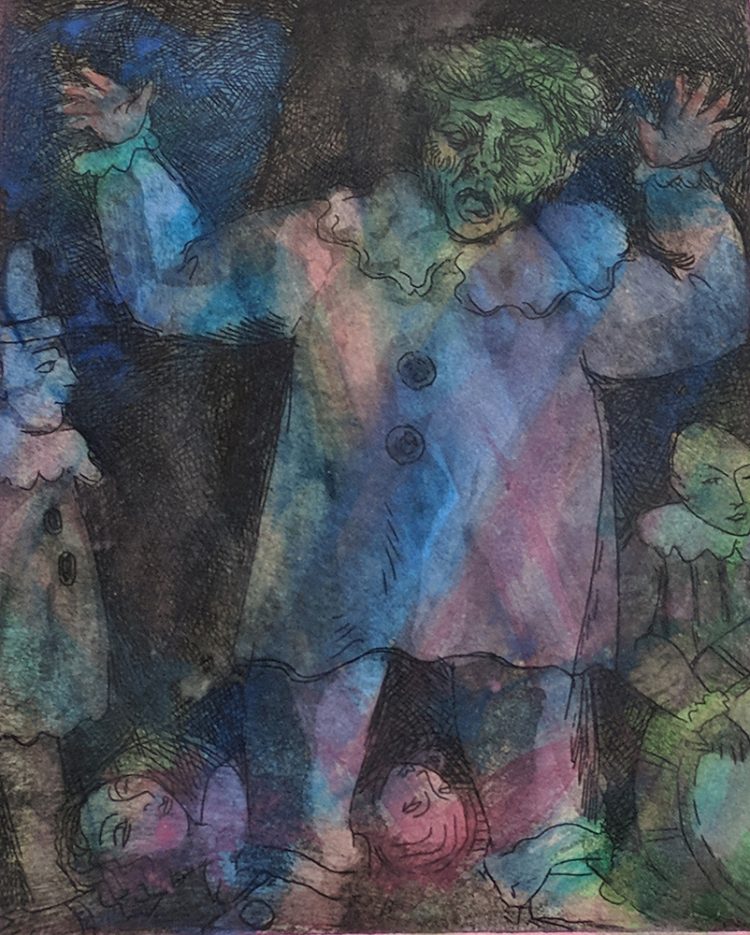
About this Work
About the Artist
American
b. 1917 Lawrence, Massachusetts
d. 2014 Hyannis, MassachusettsBorn in 1917 to Sicilian immigrants in Lawrence, Massachusetts, John Grillo learned about art making early on from his father who sculpted and painted; in 1935, Grillo enrolled full time at the Hartford School of Fine Arts. His initial pursuits leaned towards portrait and landscape painting with the poor and working class as subjects. This subject matter explains his early and deep affection for Van Gogh and Daumier, both who painted common people and their struggles. In one of his earliest works titled Funeral (1943), Grillo paints ordinary people in a funeral procession grieving quietly.
Like most men of his generation, Grillo entered WWII in the mid 1940s and was sent to Okinawa. While overseas, he continued to paint landscapes and scenes of life in the service. During this time, he shifted from conventional modes of painting towards the burgeoning abstractionist movement. After the war, Grillo arrived in San Francisco and enrolled in the San Francisco School of Fine Arts under the G.I. Bill. Here, he used unusual materials strewn on his canvases while also experimenting with different washes and designs. In 1947, he studied with Mark Rothko and amassed a large body of work that enabled him to have his first one-man show at Daliel’s Gallery in Berkeley which earned him a Samuel S. Bender Award for painting. Although Grillo lived in San Francisco only a short while his role in the San Francisco art world was influential. According to Thomas Albright, 1985, “Grillo is acknowledged as perhaps the first and purest “action painters” on the West Coast and one of the most influential painters of San Francisco’s school of Abstract Expressionism.” After San Francisco, Grillo studied with Hans Hofmann in New York and Provincetown, Massachusetts and had one-man shows experimenting with grid paintings and symbolism based on Hofmann’s influence. In the 1960s in addition to his shows in New York, Grillo was also artist in residence at the University of California, Berkeley. Upon returning to New York, he started working in three-dimensions producing fired clay and lost wax pieces and experimented with anthropomorphic qualities with one piece being acquired by the Guggenheim Museum. At the end of the 1960s Grillo joined the faculty at the University of Massachusetts in Amherst and taught his students by initiating participatory events in public places, thematic performances and artistic carnivals.Over the course of his six-decade career, Grillo had over 85 solo shows. His works are in the collections of the Museum of Modern Art, the Whitney Museum of American Art, and the Metropolitan Museum of Art, among others.
b. 1917 Lawrence, Massachusetts
d. 2014 Hyannis, MassachusettsBorn in 1917 to Sicilian immigrants in Lawrence, Massachusetts, John Grillo learned about art making early on from his father who sculpted and painted; in 1935, Grillo enrolled full time at the Hartford School of Fine Arts. His initial pursuits leaned towards portrait and landscape painting with the poor and working class as subjects. This subject matter explains his early and deep affection for Van Gogh and Daumier, both who painted common people and their struggles. In one of his earliest works titled Funeral (1943), Grillo paints ordinary people in a funeral procession grieving quietly.
Like most men of his generation, Grillo entered WWII in the mid 1940s and was sent to Okinawa. While overseas, he continued to paint landscapes and scenes of life in the service. During this time, he shifted from conventional modes of painting towards the burgeoning abstractionist movement. After the war, Grillo arrived in San Francisco and enrolled in the San Francisco School of Fine Arts under the G.I. Bill. Here, he used unusual materials strewn on his canvases while also experimenting with different washes and designs. In 1947, he studied with Mark Rothko and amassed a large body of work that enabled him to have his first one-man show at Daliel’s Gallery in Berkeley which earned him a Samuel S. Bender Award for painting. Although Grillo lived in San Francisco only a short while his role in the San Francisco art world was influential. According to Thomas Albright, 1985, “Grillo is acknowledged as perhaps the first and purest “action painters” on the West Coast and one of the most influential painters of San Francisco’s school of Abstract Expressionism.” After San Francisco, Grillo studied with Hans Hofmann in New York and Provincetown, Massachusetts and had one-man shows experimenting with grid paintings and symbolism based on Hofmann’s influence. In the 1960s in addition to his shows in New York, Grillo was also artist in residence at the University of California, Berkeley. Upon returning to New York, he started working in three-dimensions producing fired clay and lost wax pieces and experimented with anthropomorphic qualities with one piece being acquired by the Guggenheim Museum. At the end of the 1960s Grillo joined the faculty at the University of Massachusetts in Amherst and taught his students by initiating participatory events in public places, thematic performances and artistic carnivals.Over the course of his six-decade career, Grillo had over 85 solo shows. His works are in the collections of the Museum of Modern Art, the Whitney Museum of American Art, and the Metropolitan Museum of Art, among others.
